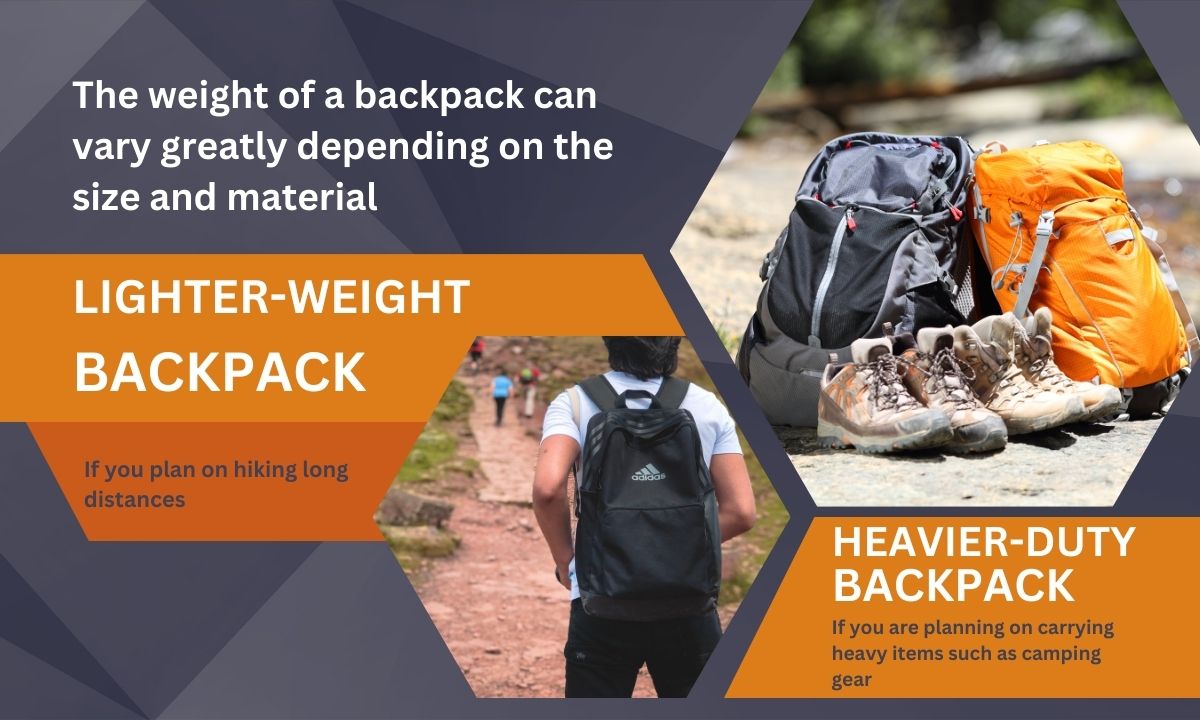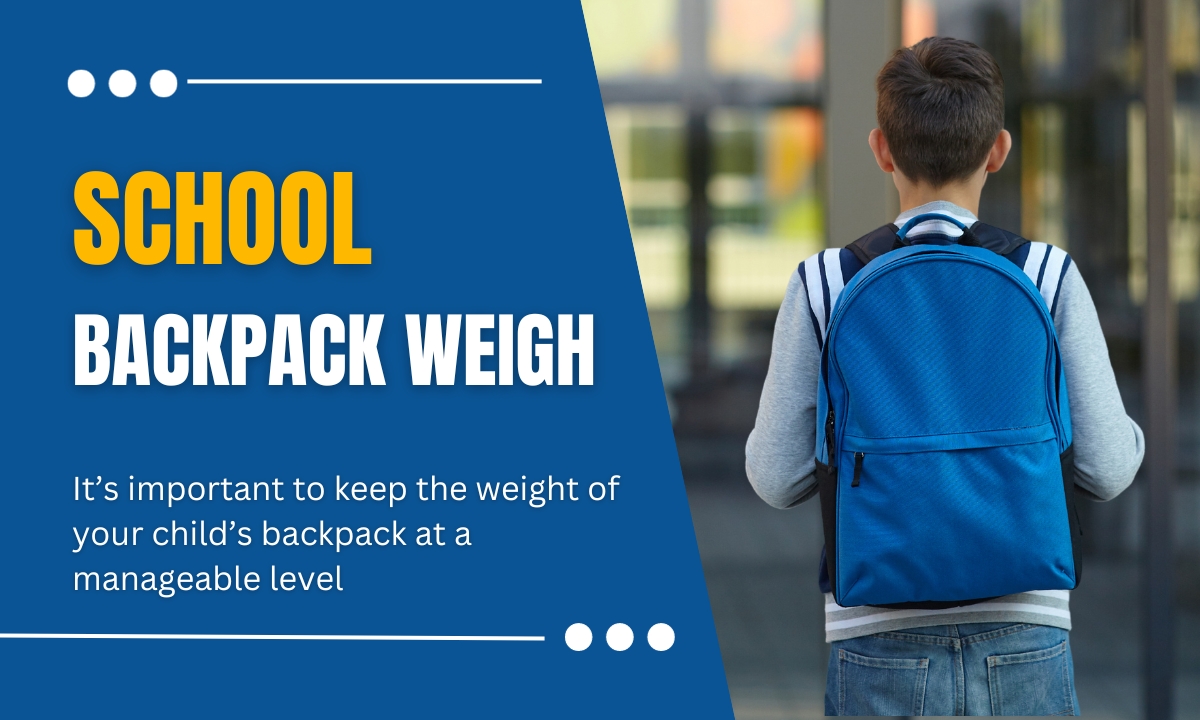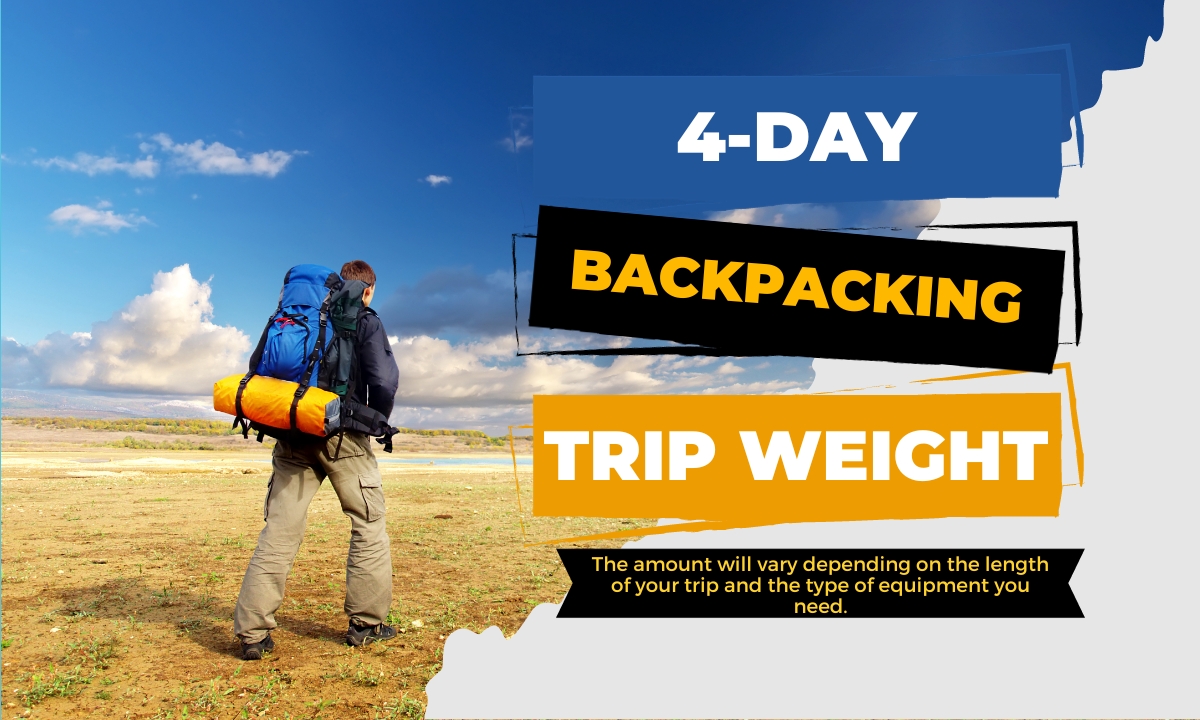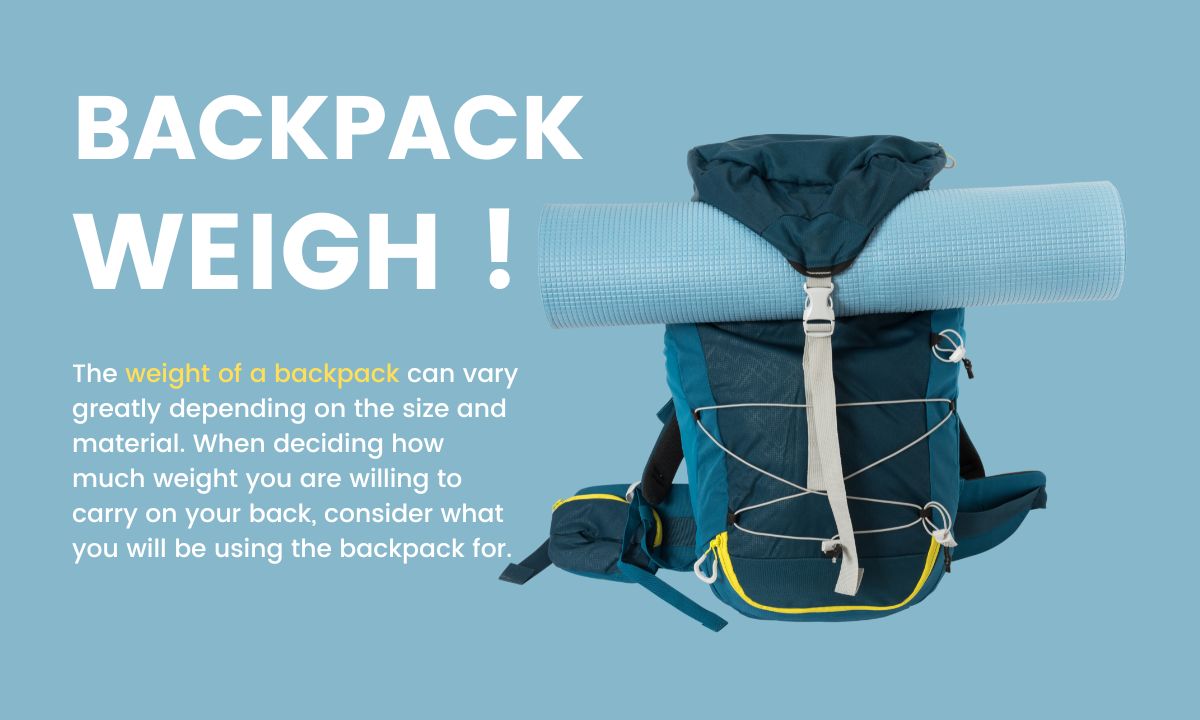A backpack is one of the most essential items for a hiker or camper. However, before purchasing a backpack, it is important to consider how much it will weigh. The weight of a backpack can vary greatly depending on the size and material.
For example, a small backpack made from lightweight materials may only weigh a few ounces, while a large backpack made from heavier materials could weigh over 10 pounds. When deciding how much weight you are willing to carry on your back, consider what you will be using the backpack for. If you plan on hiking long distances, you may want to purchase a lighter-weight backpack.

On the other hand, if you are planning on carrying heavy items such as camping gear, you may want to choose a heavier-duty backpack. No matter what type of pack you choose, be sure to try it on before purchasing to ensure that it is comfortable and fits well.
How much does a backpack weigh? This is a question that we get asked a lot, and it really depends on the backpack. A small daypack might only weigh a few pounds, while a larger hiking pack can easily weigh 10-15 pounds or more.
The weight of your backpack also depends on what you put in it. If you’re carrying a lot of heavy gear, then your backpack will be heavier. So, if you’re trying to figure out how much your pack will weigh, it’s best to start by looking at what you need to bring with you.
Once you have an idea of the items you’ll be carrying, look for a backpack that’s designed for the type of activity you’re doing. For example, if you’re going on a day hike, you won’t need as much capacity or padding as someone who’s going backpacking for several days. And if you’re carrying extra gear like climbing equipment or a camera, make sure to get a pack that has enough room and is designed to carry those types of items safely.
Finally, keep in mind that the weight of your backpack includes not just the weight of the bag itself but also any straps or other accessories (like rain covers) that are attached to it. So when choosing a pack, always check the total weight including all these extras before making your final decision.
How much does a wet backpack weigh?
How Heavy is an Average Backpack?
Assuming you are referring to a backpack for school or work, they typically weigh between 10 and 20 pounds. However, the weight of a backpack can vary greatly depending on the materials it is made from, its size, and how much it is packed with. For example, a small child’s backpack may only weigh a few pounds while a large adult hiking backpack can easily weigh over 50 pounds when fully loaded.
Is a 35 Pound Backpack Heavy?
A 35-pound backpack is not heavy for most people. However, it may be uncomfortable to wear for extended periods of time and can cause back pain. It is important to choose a backpack that is the right size and weight for you.
How Much Does a Backpack Weigh in Kg
When it comes to backpacks, there is no one-size-fits-all answer to the question of how much they weigh in kg. The weight of a backpack will vary depending on its size, material, and the amount of gear you’re carrying inside it. However, we can give you some general guidelines to help you estimate the weight of your backpack.
A small backpack typically weighs between 0.5 and 1 kg, while a larger backpack can weigh up to 2 kg or more. If you’re carrying a lot of gear inside your backpack, such as for camping or hiking, the weight will be closer to the upper end of this range. And if your backpack is made from heavier materials like leather, it will also weigh more than one made from lighter fabric.
To get a good estimate of how much your particular backpack weighs in kg, simply fill it with all the gear you plan on carrying and then weigh it on a scale. This will give you the most accurate number to work with.
How Much Should a School Backpack Weigh
How Much Should a School Backpack Weigh? Most schools have weight limits for backpacks, usually 10% of the child’s body weight. But even if your school doesn’t have a limit, it’s important to keep the weight of your child’s backpack at a manageable level.
Here are a few tips to help you do that:

Backpack Weight Calculator
As a rule of thumb, your backpack should weigh no more than 10-15% of your body weight. So, if you weigh 150 lbs., your pack should ideally weigh between 15 and 22.5 lbs.
Of course, there are many factors that will affect the perfect weight for your individual backpack, including the type of terrain you’ll be hiking on, the length of your hike, and what you plan to bring with you. But using this 10-15% rule is a good place to start when trying to determine how much weight your backpack should carry. There are a few different ways to calculate the ideal weight for your backpack.
One is to use an online calculator like this one from REI. You simply enter your body weight, the type of terrain you’ll be hiking on (e.g., flat or mountainous), and the duration of your hike. The calculator then spits out an estimated range for how much weight your backpack should carry based on those factors.
Another way to calculate the ideal backpack weight is by using something called the Base Weight System. This system was developed by ultralight backpacking guru Ray Jardine, and it’s based on the idea that every item in your pack should have a specific purpose and function. To figure out your base weight, simply add up the weights of all essential items in your pack (e.g., shelter, sleeping bag, clothing) excluding food, water, and fuel.
Your base weight should ideally be no more than 10% of your body weight; so again, if you weigh 150 lbs., aim for a base weight of 15 lbs. or less.
Of course, there’s no need to obsess over numbers when it comes to packing light. The most important thing is that you’re comfortable carrying whatever amount of weight you have in your backpack, whether it’s at the low end or high end of recommended ranges. And remember: even if you don’t achieve ultralight perfection, every ounce counts when it comes time to strap on that heavy load and hit the trail!
Backpacking Weight Chart Kg
A backpacking weight chart is a great way to estimate how much your backpack will weigh. Here are some tips on using a backpacking weight chart: -Measure the dimensions of your backpack and use the corresponding weight chart.
Average Backpack Weight for Appalachian Trail
The average backpack weight for the Appalachian Trail is approximately 30 pounds. This includes everything you will need to survive on the trail, including food, water, shelter, and clothing. Of course, your actual pack weight will vary depending on the season and your personal gear choices.

So why is a lighter backpack better? For one, it’s easier on your body. Carrying a heavy load day after day can take a toll on your shoulders, back, and legs.
A lighter pack also means you can move more easily and cover more ground each day. And if you’re carrying less weight, that also means you don’t need as much food and water to sustain yourself – which can lighten your load even further. Of course, there are trade-offs to going lighter.
You may have to sacrifice some comfort or convenience items in order to save weight. And in some cases, going too light can be dangerous – if you don’t have enough supplies with you in an emergency situation. But if you strike the right balance, carrying a lighter backpack can make your Appalachian Trail experience much more enjoyable.
Average Backpack Weight High School
As a high school student, you are expected to bring a backpack with you to school every day. But how much does the average backpack weigh? The answer may surprise you.
According to a recent study, the average backpack weight for high school students is between 10 and 20 pounds. That’s a lot of weight to be carrying around on your back all day! So why is the average backpack so heavy?
There are a few reasons. First, textbooks are getting heavier as they add more content and photos. Second, many students carry around laptops or other electronic devices in their backpacks.
Finally, some students pack their backpacks with extra clothes or snacks in case they need them during the day.
If you find yourself carrying a heavy backpack, there are a few things you can do to lighten the load. First, see if your school offers digital textbooks that you can access on your laptop or tablet instead of lugging around physical books.
Second, pack only what you need for the day and leave unnecessary items at home. And finally, invest in a good quality backpack with comfortable straps that won’t dig into your shoulders. Carrying a heavy backpack can be tough on your body, so it’s important to take steps to reduce the amount of weight you’re carrying around each day.
By following these tips, you can help make sure that your backpack doesn’t weigh you down too much.
4-Day Backpacking Trip Weight
Whether you’re an experienced backpacker or just getting started, planning a backpacking trip can be daunting. There are many factors to consider when planning your trip, including the length of time you’ll be gone, what kind of terrain you’ll be hiking, and what kind of weather you can expect. But one of the most important things to think about is how much your backpack will weigh.

The average backpacker carries between 30 and 40 pounds (14-18 kg) of gear, but the amount will vary depending on the length of your trip and the type of equipment you need. For example, if you’re going on a short day hike, you won’t need to bring as much food and water as someone who’s embarking on a week-long backpacking trip. Likewise, if you’re hiking in warm weather, you won’t need to pack as many clothes as someone who’s hiking in cold weather.
To get an idea of how much weight your backpack should ideally carry, divide the total weight by the number of days you’ll be gone. For example, if your goal is to keep your backpack under 40 pounds (18 kg), and you’re planning a four-day trip, that means each day’s worth of gear should weigh no more than 10 pounds (4.5 kg). This may seem like a lot at first glance, but remember that it includes everything from your tent and sleeping bag to your food and water.
Of course, there’s no hard and fast rule for how much weight your backpack should hold. Ultimately, it depends on your personal preferences and abilities. If carrying a heavier load doesn’t bother you, then by all means, pack more gear.
But if lugging around a heavy backpack is going to ruin your trip, then it’s better to scale back and leave some items behind.
Base Weight Calculator
If you are trying to lose weight, gain muscle, or simply maintain your current weight, knowing your base weight is essential. Your base weight is the amount of calories you need to consume each day just to maintain your current weight. To calculate your base weight, start by determining your basal metabolic rate (BMR).
This is the number of calories you burn in a day while at rest. You can use an online BMR calculator or estimate your BMR using the following formula:
For women: BMR = 655 + ( 4.35 x weight in pounds ) + ( 4.7 x height in inches ) – ( 4.7 x age in years )
For men: BMR = 66 + ( 6.23 x weight in pounds ) + ( 12.7 x height in inches ) – ( 6.8 x age in years ) Once you have determined your BMR, multiply it by a factor that takes into account your activity level:
Conclusion
How Much Does a Backpack Weigh? is a blog post that discusses the average weight of backpacks. The author states that the average backpack weighs between 2 and 4 pounds.
However, there are some backpacks that can weigh as much as 10 or even 20 pounds. The author says that the weight of a backpack can vary depending on the material it is made from, the size of the backpack, and how much stuff is inside it.




